The Ojibways discard their primitive utensils and
weapons--They learn the value of the furred animals--Yearly visits to Quebec
for purposes of trade--They radiate in hands from the bay of Shag-a-waum-ik-ong--The
fur trade the main cause of their future movements and conquests--Mode of
carrying on their wars--Tradition of Bi-aus-wah--He dies for his son--A war
party raised to revenge his death--Six Fox villages destroyed--Foxes retire
to Wisconsin--Wa-we-gis-ug-o locates a village at Fond du Lac--Nature of
their intercourse with the whites at this period--Great convocation of
tribes at Sault Ste. Marie 1671--Object of the French in this
movement--Words addressed to the Ojibway chief by the French envoy--Ojibways
learn to love the French--Causes thereof--Remarks on the nature of their
treatment and intercourse, as compared with that of the British and United
States Governments.
We have now come to that period in their history, when the
important consequences of their discovery and intercourse with the white
race began to work their effects upon the former even, monotonous, and
simple course of life, which the Ojibways had pursued for so many
generations. Their clay kettles, pots, and dishes were exchanged for copper
and brass utensils; their comparatively harmless bow and arrow, knives and
spears of bones, were thrown aside, and in their place they procured the
fire-arm, steel knife, and tomahawk of the whites. They early became aware
of the value of furs to the white strangers, and that the skins of animals,
which they before used only for garments, now procured them the coveted
commodities of the pale-faced traders, and the consequence was, that an
indiscriminate slaughter, from this period commenced, of the beaver and
other fur animals, which had grown numerous because molested only on
occasions when their warm fur had been needed to cover the nakedness of the
wild Indian, or their meat required to satisfy his hunger.
In the early part of the seventeenth century the Ojibways
had already commenced the custom of yearly visiting Quebec, and afterwards
Montreal, taking with them packs of beaver skins, and returning with the
firearms, blankets, trinkets, and firewater of the whites. This custom they
kept up for many years, gradually curtailing the length of their journeys as
the whites advanced toward them step by step, locating their trading posts,
first at Detroit, then at Mackinaw, then at Sault Ste. Marie, till at last
the smoke of their cabins arose from the island of La Pointe itself, when
these periodical journeys came comparatively to an end.
It was many years before the first French traders located
a permanent trading post among the Ojibways of Shag-a-waum-ik-ong, and in
the mean time, as this tribe became supplied with fire-arms, and killed off
the beaver in the vicinity of their ancient seat, they radiated in bands
inland, westward and southward towards the beautiful lakes and streams which
form the tributaries of the Wisconsin, Chippeway, and St. Croix rivers, and
along the south coast of the Great Lake to its utmost extremity, and from
thence even inland unto the headwaters of the Mississippi. All this was the
country of the Dakotas and Foxes, and bravely did they battle to beat back
the encroaching Ojibways from their best hunting grounds, but in vain; for
the invaders, besides having increased in numbers, had become possessed of
fearful weapons, against which they feared to battle with their primitive
bow and arrow.
For a number of years the Ojibways continued to consider
the bay of Shag-a-waum-ik-ong as their common home, and their hunting
parties returned thither at different seasons of the year. Here also, and
only here, were their grand medicine rites performed, and their war parties
collected to march against, and drive further back, their numerous foes. The
fur trade has been the mainspring and cause which has led the Ojibways
westward and more westward, till they have become possessed through
conquest, and a persevering, never-relaxing pressure on their enemies, of
the vast tracts of country over which they are scattered at the present day.
Their present proud position in this respect they have not gained without an
equivalent price in blood and life, and the Ojibway exclaims with truth when
asked by the grasping "Long Knife" to sell his country, that "it is strewed
with the bones of his fathers, and enriched with their blood."
Their wars at this period were generally carried on by
small and desultory parties, and it was only on occasions when smarting
under some severe blow or loss, inflicted by their enemies, that the
warriors of the tribe would collect under some noted leader, and marching
into the Dakota or Fox country, make a bold and effective strike, which
would long be remembered, and keep their enemies in fear and check.
A circumstance happened, about this time, which, in the
regular course of our narrative, we will here relate. A few lodges of
Ojibway hunters under the guidance of Bi-aus-wah, a leading man of the
tribe, claiming the Loon Totem, was one spring encamped at Kah-puk-wi-e-kah,
a bay on the lake shore situated forty miles west of La Pointe.
Early one morning the camp was attacked by a large
war-party of Foxes, and the men, women and children all murdered, with the
exception of a lad and an old man, who, running into a swamp, and becoming
fastened in the bog and mire, were captured and taken in triumph by the
Foxes to their village, there to suffer death with all the barbarous
tortures which a savage could invent.
Bi-aus-wah, at the time of the attack, was away on a hunt,
and he did not return till towards evening. His feelings on finding his
wigwams in ashes, and the lifeless, scalpless remains of his beloved family
and relatives strewed about on the bloodstained ground, can only be
imagined. He had lost all that bound him to life, and perfectly reckless he
followed the return trail of the Foxes determined to die, if necessary, in
revenging the grievous wrong, which they had inflicted on him. He arrived at
the village of his enemies, a day after their successful war-party had
returned, and he heard men, women, and children screaming and yelling with
delight, as they danced around the scalps which their warriors had taken.
Secreting himself on the outskirts of the village, the
Ojibway chieftain waited for an opportunity to imbrue his hands in the blood
of an enemy who might come within reach of his tomahawk. He had not remained
long in his ambush, when the Foxes collected a short distance from the
village, for the purpose of torturing and burning their two captives. The
old man was first produced, and his body being wrapped in folds of the
combustible birch bark, the Foxes set fire to it and caused him to run the
gauntlet amid their hellish whoops and screams; covered with a perfect blaze
of fire, and receiving withal a shower of blows, the old man soon expired.
The young and tender lad was then brought forward, and his
doom was to run backwards and forwards on a long pile of burning fagots,
till consumed to death. None but a parent can fully imagine the feelings
which wrung the heart of the ambushed Ojibway chieftain, as he now
recognized his only surviving child in the young captive who was about to
undergo these torments. His single arm could not rescue him, but the brave
father determined to die for or with his only son, and as the cruel Foxes
were on the point of setting fire to the heap of dry fagots on which the lad
had been placed, they were surprised to see the Ojibway chief step proudly
and boldly into their midst and address them as follows:--
"My little son, whom you are about to burn with fire, has seen but a few
winters; his tender feet have never trodden the war path--he has never
injured you! But the hairs of my head are white with many winters, and over
the graves of my relatives I have hung many scalps which I have taken from
the heads of the Foxes; my death is worth something to you, let me therefore
take the place of my child that he may return to his people."
Taken totally by surprise, the Foxes silently listened to
the chief's proposal, and ever having coveted his death, and now fearing the
consequence of his despairing efforts, they accepted his offer, and
releasing the son, they bade him to depart, and burnt the brave father in
his stead. The young man returned safely to his people at La Pointe, and the
tale of his murdered kindred, and father's death, spread like wild fire
among the wide scattered bands of the Ojibways.
A war party was gathered and warriors came, even from
distant Ste. Marie and Grand Portage, to join in revenging the death of
their chief.
They marched toward the headwaters of the St. Croix and
Chippeway Rivers, and returned not home till they had attacked and destroyed
six villages of the Foxes, some of which were composed of earthen wigwams,
which now form the mounds, which are spread, so profusely over this section
of country. They reaped a rich harvest of scalps, and made such an effective
strike, that from this time the Foxes evacuated the rice lakes and midland
country about the St. Croix and Chippeway Rivers, and retired south to the
Wisconsin.
Soon after the above occurrence, the Ojibways pressed up
the lake shore, and Wa-me-gis-ug-o, a daring and fearless hunter, obtained a
firm footing and pitched his wigwam permanently at Fond du Lac, or
Wi-a-quah-ke-che-gume-eng. He belonged to the Marten Totem family, and the
present respected chiefs of that now important village, Shin-goob and
Nug-aun-ub, are his direct descendants. Many families of his people followed
the example of this pioneer, and erecting their wigwams on the islands of
the St. Louis River, near its outlet into the lake, for greater security,
they manfully heldout against the numerous attacks of the fierce Dakotas,
whose villages were but two days' march toward the south on the St. Croix
River, and the west, at Sandy Lake. During this time, comprised between the
years 1612 (at which I date their first knowledge of the white race), and
1671, when the French made their first national treaty or convocation at
Sault Ste. Marie with the northwestern tribes, no permanent trading post had
as yet been erected on the shores of Lake Superior; the nearest post was the
one located at Sault Ste. Marie, which as early as the middle of the
seventeenth century, had already become an important depot and outlet to the
Lake Superior fur trade. Their intercourse with the whites consisted in
yearly visits to their nearest western posts. The trade was partially also
carried on through the medium of the intervening kindred tribe of Ottaways,
or by adventurous traders who came amongst them with canoes loaded with
goods, made a transient stay, sometimes even passing a winter amongst them,
following their hunting camps, but returning in the spring of the year to
Quebec with the proceeds of their traffic. No incident which the old men
related as connected with the whites, is worthy of mention, till a messenger
of the "Great French King" visited their village at Shag-a-waum-ik-ong, and
invited them to a grand council of different tribes to be held at Sault Ste.
Marie. Some of the words of this messenger are still recollected and
minutely related by the Ojibways.
conclude chapter 8
1
- 2
- 3
- 4
- 5
- 6
- 7
- 8
- 9
- 10
11
- 12
- 13
- 14
- 15
- 16
- 17
- 18
- 19
- 20
21
- 22
- 23
- 24
- 25 - 26 - 27 - 28 - 29 - 30
White Eagle Soaring: Dream Dancer of the 7th Fire

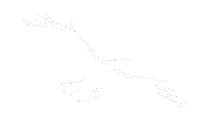
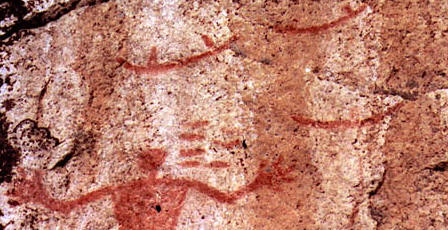
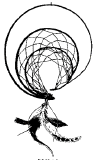
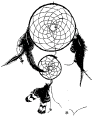
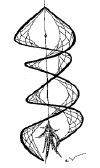


 Get
a course to promote your business online, explode your sales
Get
a course to promote your business online, explode your sales Get
software to promote your business online in less time
Get
software to promote your business online in less time Get
software to streamline your business and run it hands free.
Get
software to streamline your business and run it hands free.